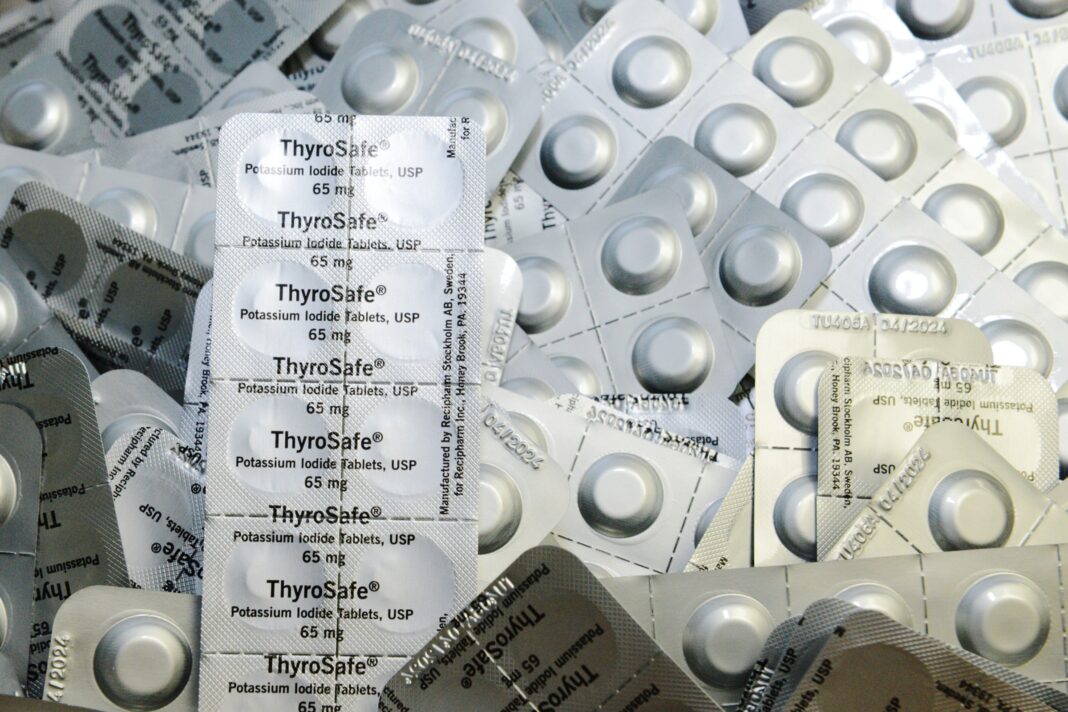As unease about Russia’s nuclear saber-rattling grows, along with concerns about the safety of Ukraine’s Zaporizhzhia nuclear power plant, officials in Kyiv are distributing iodine pills to help protect residents against potential radiation exposure. In neighboring Poland, the government is also making free iodine tablets available . Likewise, in Finland, pharmacies are running out of the pills after the country’s health ministry advised households to buy them in case of an emergency.
Such measures are precautionary, but they can also put people on edge. Google searches for “potassium iodide”—a naturally occurring type of iodine that can counteract some effects of radiation—spiked at the end of February shortly after the Russian invasion of Ukraine and are trending upward again . The war has also sparked panic buying of the pills in several European countries, including Belgium , France , Bulgaria, and the Czech Republic , although intelligence experts have been at pains to point out—despite US president Joe Biden’s alarmist remarks —that there are no signs that Russia is planning to use nuclear weapons.
Likewise, though the situation at Zaporizhzhia is precarious following two recent power outages, as of October 14, backup power had been restored . Just because you can go online and stock up on iodine tablets, doesn’t mean you should. And in countries where they are being distributed as a precaution, it’s also important to understand what the pills can and cannot do.
First, the pills, which contain potassium iodide, aren’t an antidote for all forms of radiation exposure. Also, they’re only able to protect the thyroid—the small, butterfly-shaped gland that sits at the base of the neck. Nuclear weapons and power plants rely on a process called fission, or the splitting of atoms into fragments, to generate a large amount of energy.
During a nuclear strike or plant meltdown, one of the radioactive substances that’s released is iodine-131, a dark purple gas that can be absorbed through the skin or inhaled. Once it enters the body, it’s absorbed by the thyroid. This gland is good at soaking up iodine, because natural iodine is needed to produce essential hormones.
But exposure to the radioactive version damages the delicate organ and raises the risk of thyroid cancer. Children are the most at risk. Following the nuclear accident at the Chernobyl power plant in 1986, there was a marked increase in thyroid cancer cases in children and adolescents in the years following the disaster.
(A study 35 years later found that radiation-related gene mutations did not, however, get passed to the future children of those who had been exposed. ) The risk is much lower in people 40 and older, and the World Health Organization and US Centers for Disease Control and Prevention generally don’t recommend potassium iodide for that age group unless the projected radiation dose is very high. Iodine pills block the thyroid from absorbing radioactive iodine by filling it with the regular kind—the gland can only absorb so much at once, and it can’t tell the difference between the two types.
“The human thyroid has a finite capacity for iodine. If you overload it with iodine from other sources, it’ll basically be full,” says Edward Geist, a policy researcher on nuclear energy and warfare at the RAND Corporation, a Washington, DC-based think tank. “That means when you encounter this radioactive iodine, you’re much less likely to absorb it in your thyroid and you get a much lower dose from having this iodine in you.
” While the pills can be very effective at preventing thyroid damage, they don’t protect any other part of the body—and they’re not effective against other radiation hazards, including electromagnetic rays and fallout particles that penetrate the body. “It’s not a silver bullet,” Geist says. “If you’re downwind of a surface burst of a nuclear weapon, the pills are only going to make you marginally safer than you otherwise would be.
” Geist says potassium iodide pills are more likely to be helpful in the event of a nuclear power plant accident—when far less radiation is released—especially in the first weeks afterward, when the main hazard is radioactive iodine. Potassium iodide generally comes in doses of 130 milligrams each. The World Health Organization recommends one tablet for adults and children 12 and older, a half tablet for those aged 3 to 12, a quarter for babies and toddlers, and one-eighth for newborns.
The tablets also shouldn’t be overused, or used too early. Health officials say they should not be taken until instructed by authorities, because the effectiveness of potassium iodide depends on the time frame in which the pills are taken, how much radioactive iodine gets into the body, and how quickly the body absorbs it. One dose typically provides protection for about 24 hours.
To be most effective, the pills must be taken within 24 hours before, or four hours after, radiation exposure. “It’s a fairly narrow time window,” says Pat Zanzonico, a medical physicist at Memorial Sloan Kettering Cancer Center in New York. Zanzonico says potassium iodide is very safe to ingest over a period of several days, but excessive amounts over a prolonged period of time can adversely affect the function of the thyroid.
And because the thyroid can only hold so much iodine at once, there’s no benefit to taking a larger dose than recommended. Outside of Eastern Europe, Zanzonico says people probably won’t need potassium iodide pills in the highly unlikely event of a Russian nuclear attack in Ukraine—or if there is a disaster at Zaporizhzhia. In the US, Zanzonico says, the risk is incredibly low.
And even in Western Europe, people should remain calm. “Even there, there’s likely little realistic possibility of significant amounts of radioactive material being deposited. ”.
From: wired
URL: https://www.wired.com/story/iodine-pills-nuclear-radiation/



